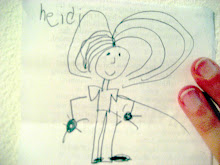Developing a children's collection
This week, another new youth librarian and I got to meet with the children's books selector for a little collection development training. I put a big dent in my list of questions and came away with a much better understanding of policies and procedures, but I also got homework. Homework! And I thought I was done with all that...
For our next meeting, I'm to bring books that are important to me...books that I rely on, refer to, and frequently recommend. I'm supposed to select 10 each from the picture books, easy readers, and toddler collections. Not a bad little assignment, but I hope we meet at my branch, that's an awful lot to carry.
But that's not all. I'm supposed to read my way through everything in Anita Silvey's 100 Best Books for Children. Which isn't too bad, considering I've already read about half of the titles. Some of them I haven't read since I was a kid, some I've read over and over. Some I read for school, and of those, there are some that I fiercely disliked. Others were given to me as gifts when I was young, things a grownup thought I should read (and didn't).
We started our chat with a pop quiz: What do you think makes a good children's collection? From there, we worked our way through the cycle of collection development, and more specifically how it is approached at MPOW. Our collections guru broke it down like this:
Adding
Weeding
Displaying
Recommending
Knowing
I gotta admit, that's as nice as any summary I've seen, and certainly easier to remember than anything in a library textbook.



4 Comments:
What were the books on the list that you fiercy disliked, and the ones an adult thought you should read -- and didn't? I ask because I took a quick look at the list, and noticed "In the Year of the Boar and Jackie Robinson", which I received as a gift when I was young, but didn't actually read all the way through. All I remember about the book was feeling guilty for not enjoying it.
In my dabblings on the Children's literature side of things at library school, I recall that the Where's Waldo books only came up once. Has this series of books not had much longevity? I can't think of a series of books that I enjoyed more as a kid, but I only hear about it now when people my age fondly/ironically recollect Waldo (e.g. dressing up as Waldo for Halloween parties).
Try as I might, I can only come up with two acronyms that might work:
K-DRAW and KRAWD
I kinda like KRAWD cause it makes me think of crawdads which have pinchers and when you think about it, collection development would be a lot harder if you had pinchers.
K-DRAW works better cause it's almost like "Okay, Draw!" in an old western movie. Except collection development isn't so much a gunfight as a balance between weeding and adding to your collection. Like an impasse. Which also could be called a DRAW!
:-)
I had to read Julie of the Wolves in the 4th grade, and I recall telling anyone who would listen that I thoroughly resented being forced to read such a BORING book. I think my aunt or my grandma gave me Misty of Chincoteague, which I have yet to read (sorry!). And I only got around to reading Anne of Green Gables a few years ago, though it turns out I really enjoyed that one. It was my grandma's favorite book, so there was a lot of pressure to read it (and love it) when I was young.
My girlfriend is a SMART (Start Making A Reader Today) volunteer, but she was busy to the point that I covered most of her weekly readings for her last year. It was really fun - I had two kids I read to regularly, and one of them was really sweet. He had trouble reading (he would frequently say "I can't read" in a way that broke my heart) and I remembered how goddamned hard it is to learn to read in English where the spelling has very little to do with the pronunication. I would see a word like 'laugh' coming before he got to it and cringe in advance. When I showed him the word and the trick of the gh->f, he'd look at me like his own language had betrayed him. It took me a long time to read, too, and I remember the same sense of bewilderment and betrayal.
Anyway. I was struck by the volume of books moving through the SMART reading room. It made me realize that there is a demand for new children's books of whatever quality - that is to say that there will be a volume of new children's books each year regardless of quality, just by virtue of being new, and generating new revenue for sellers. And then there are the classics, like all the ones on the list mentioned in your post, that are timeless. I think it's worth making an explicit distinction in the organization of the books.
Post a Comment
<< Home